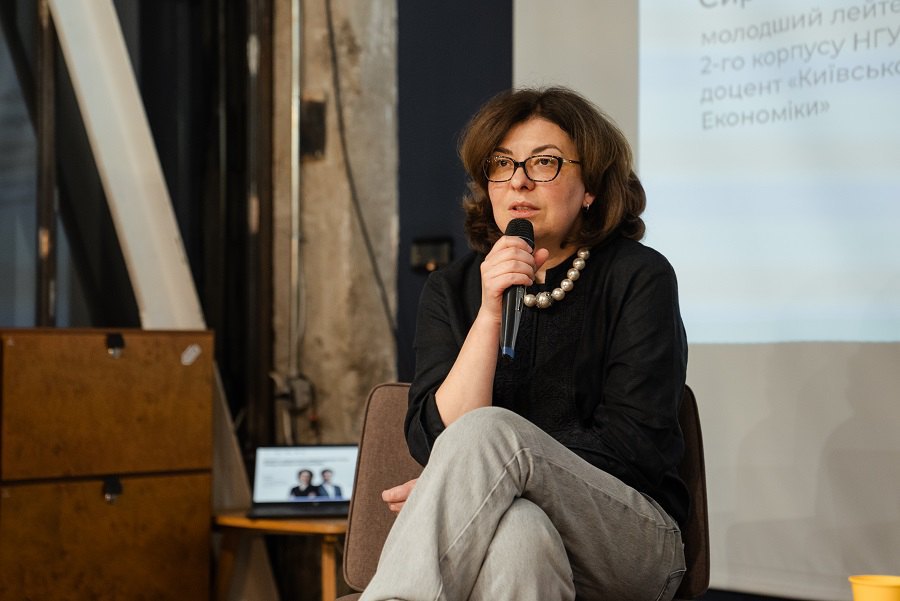Understanding the Nature of the Enemy’s Aggression Will Help Defeat It: Oksana Syroid’s Speech at Action Forum 2025

The Aspen Institute Kyiv and Promprylad hosted the second Ukrainian Action Forum in Ivano-Frankivsk. Co-organizers included the Blago company and Yehor Grebennikov. In partnership with Khartiya Hub, the Forum featured a panel discussion with Oksana Syroyid, junior lieutenant of the 2nd Corps of the National Guard of Ukraine “Khartiya”. Denis Poltavets, Director of Program Development at the Aspen Institute Kyiv, moderated the conversation. Ms. Syroyid outlined the nature of the Russian-Ukrainian war, the civilizational differences between Russians and Ukrainians, the myth of Russian “greatness,” and two paths to Ukraine’s victory.
Hostile Intentions and Hostility in Attitude: What Russia is Fighting For
Oksana Syroyid began studying the nature of war in 2014, when she became a Member of Parliament. Through research into armed conflicts in Ukraine and worldwide, she concluded that war always stems from two components — what Clausewitz called “hostile intentions” and “hostile feelings.”
Hostile intentions are expressed in the desire to gain control over resources and trade routes. Hostile feelings, on the other hand, represent the Russian worldview of devaluing and subjugating other peoples.
“Hostile intentions don’t change. For millennia, wars have been fought over access to resources and trade routes — that’s a given. We are firmly convinced of this after the blockade of the Black Sea, the theft of grain, and the seizure of deposits. Hostile feelings are much harder to study. Russia has been constructing its myth for so long that it has convinced both the Western world and Ukraine of its innocence.”
Oksana Syroyid says we cannot change Russia’s hostile intentions. But we can ask ourselves who we must become so that these intentions cannot destroy us.

Are Resources and Trade Routes the Root Cause of the War?
Continuing on the topic of hostile intentions, Oksana Syroyid argued that Russia’s supposed abundance of resources and trade routes is yet another myth. Russia needs far more than oil and gas, and Ukrainian territory is rich in resources it lacks:
“Russia built the myth that it has everything it needs. But before the war, we were one of the world’s main competitors in the production of potash fertilizers, for example. The same goes for grain.”
She also pointed to historical factors behind Russia’s imperial ambitions:
“If you look at a map of Russian railways, they end in Ukraine, Belarus, and the Baltic states. Russia lacked warm-water ports, which is why it historically pushed westward to conquer new territories.”
A Civilizational Clash Began Long Before the Russian-Ukrainian War
Regarding hostile feelings, the civilizational conflict started long before 2014. In the 17th century, Western society created a new type of state to protect individual freedom and property. Law became the foundation of all societal interactions. In contrast, Russia developed a different concept: the state was created for the sake of “greatness of the motherland.” The state decided what citizens were allowed to want. And through association with this “greatness,” the Russian leader gains legitimacy.
“A leader who cares about greatness is the right leader for Russia; a leader who cares about citizens is the wrong one.”
Syroyid explained that these differences persist to this day. The full-scale war has made clear just how differently Ukrainians and Russians value the fundamental aspects of human life. While we once believed we had much in common, it’s now obvious how vast the divide truly is.
“These two cultures are like water and oil. No matter what happens, they won’t mix.”
Syroyid believes Ukrainians are now returning to their cultural identity.
“We used to be ashamed of our nature because we were a colony for so long. We thought something was missing because we weren’t ‘European enough’. But now we are returning to ourselves — and they (Russians) are returning to themselves.”
Two Paths to Victory
Oksana Syroyid sees two ways for Ukraine to achieve victory.
The first concerns how we fight. If we can’t win through numbers, our military must be built on quality, which comes from strategic thinking, training, and purpose.
The second path is awareness of our civilizational distinction. As mentioned, this is not just about culture or language. It’s about values — our stance on freedom, the state’s role, human rights, and human dignity.
“Ukraine sits physically at the crossroads between East and West. Centuries of Russian rule left cultural imprints on us. If we want to protect ourselves from Russia’s hostile intentions, we must identify and separate ourselves from these remnants.”
Syroyid also noted that Russia pushes the narrative of a “single nation” because it wants us to believe we are not truly different, which would make Ukraine easier to conquer.
To Undermine Russia, Attack Its Idea of “Greatness”
According to Oksana Syroyid, Russia’s true vulnerability isn’t manpower, wealth, or economy — it’s the societal myth of “greatness.” “Greatness” is an abstract concept, and that makes it dangerous. It can justify any war, as long as people believe in it.
Syroyid argues that when people speak of Russia’s greatness, they are also trapped by that myth. As long as Russia exists in this paradigm, war will remain a core part of its identity.
She suggests that Ukraine and the West must target the myth of “greatness” in the information space, because that’s another battlefield we must win:
“If we want to fight Russia through information, we have to attack what makes it vulnerable — its ‘greatness.’ Their social contract isn’t between citizens and the state — it’s between citizens and power. That’s why we must show that the contract built on ‘greatness’ has failed.”
We thank Oksana Syroyid for her candid speech at the Ukrainian Action Forum and for her steadfast stance.

